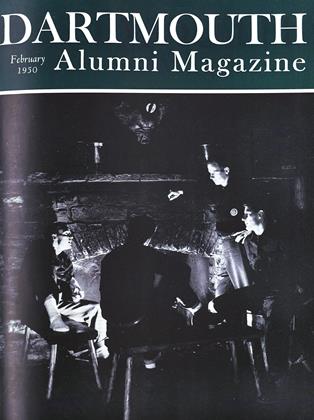1830-1840, by Prof. Robert E. Riegel. University of Oklahoma Press,1949. pp. xii-436. $5.00.
This is the kind of history I like. As Mr. Dooley says, there is a great deal of history that isn't true because "it ain't like what I see ivry day in Halstead Street." Professor Riegel is Mr. Dooley's man because he has written a book "that'll show me th' people fightin', gettin' dhrunk, makin' love, gettin' married, owin' the grocery man and bein' without hardcoal." There's many a book that "tells you what a country died iv." "But, Hennessy," he pleads, "I'd like to know what it lived iv."
Ranging the period covered by one of the less meritorious volumes of the American Life Series, and the era whose political story received new emphasis in the much acclaimed work of the younger Schlesinger, Professor Riegel really brings the decade of the 1830's to life. His emphasis is on the people themselves, at work, at home, and at play. He has chapters on such topics as The Farm, The Plantation, The Wage Earner, Women, Schools, Reformers, Doctors, Sports and The Arts. Pertinent illustrations and ten or a dozen verses attract and amuse, and instruct.
There is, in fact, a wealth of instruction in the book. Some of it, to be sure, is on the periphery of importance, such as the invention of the "Eccaleobian" or the origin of "Graham Bread," the techniques of Hydropathy or the procedure of the Urscopian. Yet these curiosities but lure the reader to a hundred other developments of the greatest importance—many of them most helpful in understanding our later history.
Twenty years ago the Beards spoke of the Middle Period of American History as "the most changeful, most creative, most spirited epoch between the founding of the colonies and the end of the nineteenth century." Professor Riegel's readable volume affords further striking confirmation of this contention.
 View Full Issue
View Full Issue
More From This Issue
-
 Class Notes
Class Notes1918
February 1950 By ERNEST H. EARLEY, DONALD L. BARR, RICHARD A. HOLTON -
 Article
ArticleBack to Hanover in December
February 1950 By WILLIAM H. HAM '97 -
 Class Notes
Class Notes1905
February 1950 By ROYAL PARKINSON, GILBERT H. FALL, FLETCHER A. HATCH -
 Class Notes
Class Notes1943
February 1950 By ELMER G. STEVENS JR., STANTON B. PRIDDY, THEODORE R. HOPPER -
 Article
Article"Of the People, By the People, For the People..."
February 1950 By EDWARD C. LATHEM '51 -
 Class Notes
Class Notes1936
February 1950 By NORBERT HOFMAN JR., JOHN E. MORRISON JR., ROBERT L. PATERSON
Allen R. Foley '20
-
 Books
BooksMR. MADISON'S WAR
January 1937 By Allen R. Foley '20 -
 Books
BooksHANOVER, NEW HAMPSHIRE:
July 1961 By ALLEN R. FOLEY '20 -
 Article
ArticleHANOVER'S EARLY BIRDS
December 1961 By ALLEN R. FOLEY '20 -
 Article
ArticleTHE ALUMNI CIRCUIT
March 1962 By ALLEN R. FOLEY '20 -
 Article
ArticleACROSS THE RIVER
JUNE 1963 By ALLEN R. FOLEY '20 -
 Books
BooksVirgin Dip
June 1976 By ALLEN R. FOLEY '20
Books
-
 Books
BooksCHRISTIANITY AND THE FAMILY
June 1942 -
 Books
BooksTHE ODDS, THE PLAYERS, THE HORSES.
November 1959 By CLIFF JORDAN '45 -
 Books
BooksLa condition humaine
MARCH 1984 By E. P. Thompson -
 Books
BooksTHE CONTENTION AND SHAKESPEARE'S 2 HENRY VI.
June 1954 By FRANCIS L. CHILDS '06 -
 Books
BooksThe American People and Nation.
APRIL 1928 By Philip A. Cowen -
 Books
BooksSAIL IT FLAT: THE SUNFISH RACING PRIMER.
MAY 1972 By WILLIAM J. HURST

